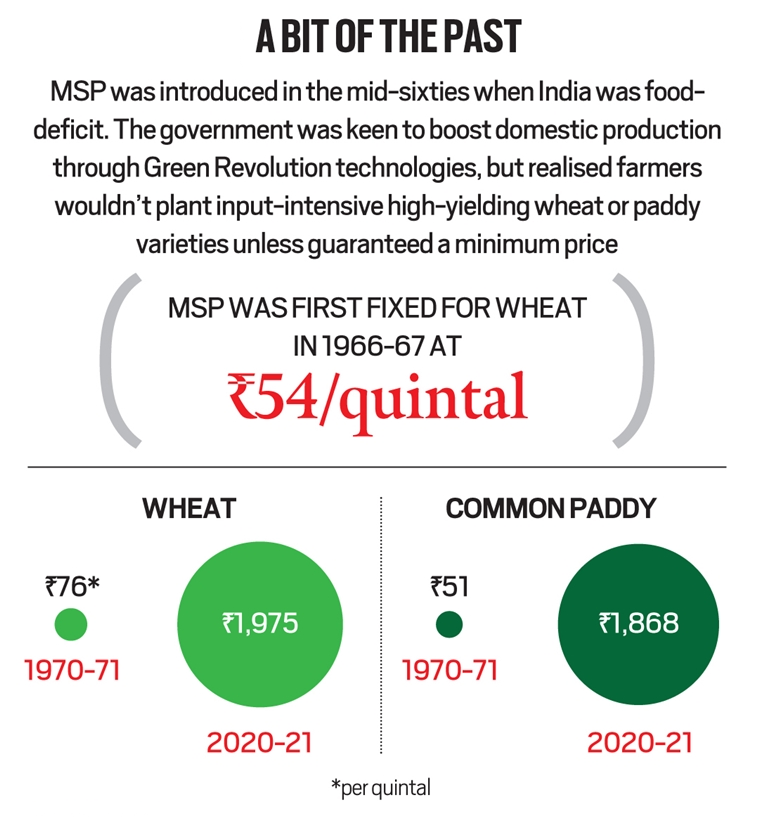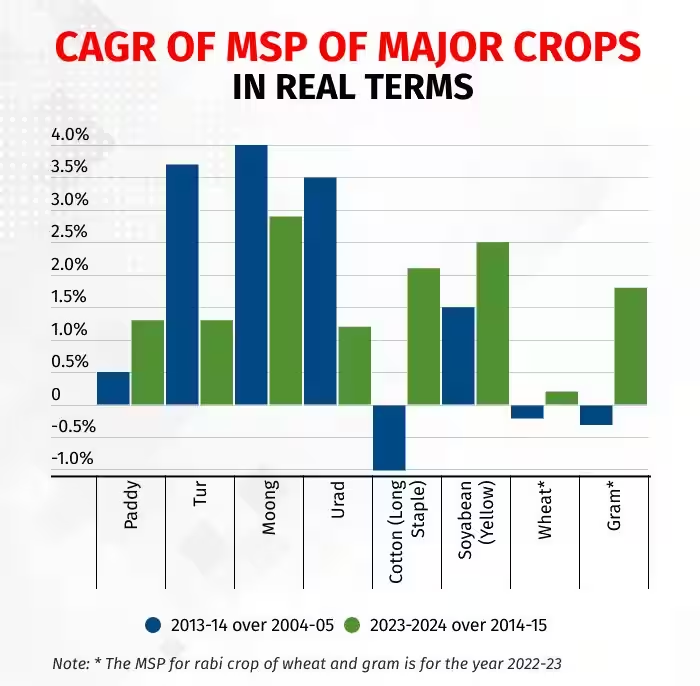Agriculture
Law on MSP: Farmers Back on Road
- 13 Feb 2024
- 15 min read
This editorial is based on “Farmers back on road to Delhi” which was published in The Indian Express on 13/02/2024. The article delves into the protesting farmers' call for a legal assurance of Minimum Support Price (MSP) in India.
For Prelims: Minimum Support Price (MSP), Commission for Agricultural Costs and Prices (CACP), National Commission of Farmers, Shanta Kumar Committee, NABARD, Price deficiency payments (PDP), Mahatma Gandhi National Rural Employment Guarantee Scheme (MGNREGS).
For Mains: Demand for Law on MSP, Key Challenges in Legalising MSP
In recent events, farmers primarily from Punjab, Haryana, and Uttar Pradesh, initiated their 'Chalo Delhi' march following an inconclusive meeting with the Union government.
The legal guarantee of Minimum Support Price (MSP) is the prime reason for the farmers' protest. Apart from this, the farmers have also demanded the implementation of the Swaminathan Commission’s recommendations (2006), as well as farm debt waiver.
What is the Minimum Support Price (MSP)?
- About :
- The MSP is a guaranteed price for their produce from the Government.
- MSP is a form of market intervention by the Government of India to insure agricultural producers against any sharp fall in farm prices.
- MSP in India is a price floor set by the government to ensure that farmers receive a minimum price for their agricultural produce, thereby safeguarding their income and encouraging agricultural production
- Crops Under MSP:
- The government announces MSPs for 22 mandated crops and Fair and Remunerative Prices (FRP) for sugarcane. The mandated crops are 14 crops of the kharif season, 6 rabi crops and two other commercial crops.
- The list of crops is as follows :
- Cereals (7): Paddy, wheat, barley, jowar, bajra, maize and ragi
- Pulses (5): Gram, arhar/tur, moong, urad and lentil
- Oilseeds (8): Groundnut, rapeseed/mustard, toria, soyabean, sunflower seed, sesamum, safflower seed and nigerseed
- Raw Cotton
- Raw Jute
- Copra
- De-husked Coconut
- Sugarcane (FRP)
- Virginia flu-cured (VFC) Tobacco
- Presently, MSPs are notified for 23 crops, but procurement is done for wheat and paddy, which meets the requirements of the public distribution system.
How MSP has been Calculated?
- The government bases its announcement on the recommendations given by the Commission for Agricultural Costs & Prices (CACP), which details three major formulas to arrive at MSP:
- A2: Costs incurred by the farmer in the production of a particular crop. It includes several inputs such as expenditure on seeds, fertilizers, pesticides, leased-in land, hired labour, machinery and fuel.
- A2+FL: Costs incurred by the farmer and the value of family labor.
- C2: A comprehensive cost, which is A2+FL cost plus imputed rental value of owned land plus interest on fixed capital, rent paid for leased-in land.
- The government maintains that the MSP was fixed at a level of at least 1.5 times of the all-India weighted average Costs of Production (CoP), but it calculates this cost as 1.5 times of A2+FL.
Why is There a Demand for Law on MSP?
- Ensuring Financial Viability of Agriculture:
- Legalising MSP guarantees that farmers receive a minimum price for their produce, protecting them from market fluctuations and ensuring fair returns on their investments and labor.
- MSP is the minimum price of agricultural produce that is necessary to keep agriculture financially viable. If the farmers do not get even this, then they will be pushed into debt.
- Reducing Debt Burden on Farmers:
- According to a 2019 National Bank for Agriculture and Rural Development (NABARD) report, the average debt burden on a farmer’s family is over Rs 1 lakh. This is despite the central and state governments providing farmers a subsidy of Rs 3.36 lakh crore.
- The total outstanding loan on farmers increased from Rs 9.64 lakh crore on March 31, 2014, to Rs 23.44 lakh crore in 2021-22.
- The debt burden on farmers is rising due to minimal increase in MSPs and because they do not receive the declared MSP.
- If the farmer has to sell his produce at a price lower than the promised MSP, the latter becomes meaningless for the farmers. Therefore, a legal guarantee of MSP is necessary.
- Supporting Farmers' Livelihoods:
- Legalising MSP helps support the livelihoods of millions of farmers, particularly small and marginalized farmers who are vulnerable to market uncertainties.
- The livelihood of about 50% of the country’s population depends on agriculture and agriculture-related activities.
- Risk Mitigation:
- No business has to deal with so many unpredictable factors and risks — extreme heat, floods, fire, frost, untimely rain, etc. Farmers remain uncertain and apprehensive about their income. MSP saves the farmer from debt and bankruptcy. Therefore, it needs to be secured with a legal guarantee.
- Natural disasters and market forces are hurting farmers. Climate change is increasing the complexity of farming. The farmer cannot be left at the mercy of weather and market forces.
- Legalising MSP provides a safety net, reducing the risk of income loss for farmers during unfavorable market conditions.
- Addressing Market Imperfections:
- The burden of providing cheap grains to protect consumer interests can’t solely rest with the farmer. Often, even when farmers sell their produce at low prices, consumers buy them at exorbitant rates. This is because of middlemen which need to be regulated.
- Legalising MSP can help mitigate these issues by providing a guaranteed price directly to farmers.
- Promoting Agricultural Growth:
- Legalising MSP encourages farmers to invest in agricultural production by providing price stability and income security. This, in turn, promotes agricultural growth and contributes to overall food security in the country.
- Legalising MSP can incentivize the adoption of sustainable agricultural practices by providing price incentives for crops that are environmentally friendly and resource-efficient.
- Addressing Disparities:
- The Shanta Kumar Committee concluded in 2015 that only 6% farmers benefited from the support price scheme.
- In 2019-20 alone, three states — Punjab, Haryana and Madhya Pradesh — accounted for 85% of the wheat procurement.
- Legalizing MSP can help mitigate these issues by providing a guaranteed uniform price directly to farmers.
- Farmer-centric policies centered around MSP legalization contribute to poverty alleviation, rural development, and social inclusion.
What are the Key Challenges in Legalising MSP?
- Financial Burden:
- Procuring crops at MSP requires substantial financial resources, and sustaining such procurement operations may strain government finances.
- Balancing the budgetary allocation for MSP with other essential expenditures such as infrastructure development, social welfare programs, and defense spending poses a challenge.
- Legal MSP cannot work if not supported by demand and supply side factors.
- Disincentive for Investment:
- MSP legalization may discourage private investment in agriculture, particularly in crops covered under MSP.
- Private players may hesitate to invest in sectors where government intervention in pricing is prevalent, limiting innovation and modernization efforts.
- Exacerbate Water Scarcity:
- MSP-supported crops like paddy and sugarcane are water-intensive, leading to overexploitation of water resources in regions where they are cultivated extensively.
- Legalising MSP may exacerbate water scarcity issues by promoting the cultivation of water-intensive crops, further distorting cropping patterns.
- Neglect of Non-MSP Crops:
- Legalising MSP may result in the neglect of non-MSP crops, leading to decreased cultivation of nutritious food crops, pulses, and oilseeds.
- This can have negative implications for food security, dietary diversity, and nutritional outcomes, particularly among vulnerable populations.
- Reduced Export Competitiveness:
- Legalizing MSP may lead to higher procurement prices for MSP-supported crops, making them less competitive in the international market.
- Elevated domestic prices could result in reduced export competitiveness, especially for crops with high MSP rates.
- Trade Disputes:
- Legalizing MSP may lead to trade disputes with importing countries, especially if the government provides subsidies or other forms of support to maintain MSP prices.
- Such disputes can result in retaliatory measures, tariffs, or trade barriers, affecting export volumes and market access. With a legally guaranteed higher MSP, India will face stiffer opposition at the World Trade Organization (WTO).
What Should be the Way Forward?
- Balanced Agricultural Pricing Policy: The government must come up with a suitable transition to agricultural pricing policy to ensure remunerative prices for agricultural produce through mechanisms like MSP and direct income support schemes.
- Enforce Swaminathan Committee Recommendation: The commission recommended that the MSP should at least be 50% more than the weighted average cost of Production (CoP), which it refers to as the C2 cost.
- Expansion of MSP Criteria: The average expenditure incurred by the farmer on education and health services for his family must also be factored in when MSP is determined.
- Price Deficiency Payments (PDP): It entails the government not physically purchasing or stocking any crop, and simply paying farmers the difference between the market price and MSP, if the former is lower. Such payment would be on the quantity of crop they sell to the private trade.
- Enhancing Farmers' Income:
- The government should not only bring agriculture activities within Mahatma Gandhi National Rural Employment Guarantee Scheme (MGNREGS) but also increase the daily wages.
- Encourage crop diversification and promote high-value and climate-resilient crops to increase farmers' income opportunities.
- Strengthen agricultural marketing infrastructure, including farm-to-market linkages, storage facilities, and market information systems, to reduce post-harvest losses and improve price realisation for farmers.
- Investing in Agricultural Infrastructure:
- Increase public investment in rural infrastructure such as irrigation facilities, roads, electrification, and storage capacities to enhance agricultural productivity and market access.
- Promote technology adoption and innovation in agriculture through research and development, extension services, and access to modern farming inputs and practices.
- Facilitate access to credit, insurance, and other financial services for smallholder farmers to mitigate production risks and improve resilience to market fluctuations.
- Improving Land and Water Management:
- Implement sustainable land and water management practices to conserve natural resources, prevent soil degradation, and enhance agricultural resilience to climate change.
- Promote efficient water use through the adoption of drip irrigation, rainwater harvesting, and water-saving technologies to address water scarcity challenges in agriculture.
- Empowering Farmers:
- Strengthen farmers' organizations, cooperatives, and producer groups to enable collective bargaining, access to markets, and participation in decision-making processes.
- Ensuring Social Protection:
- Expand social safety nets and insurance schemes to provide income and livelihood support to vulnerable farming households during periods of distress, such as crop failures, natural disasters, or market shocks.
- Improving Governance:
- Improve governance and regulatory frameworks to reduce bureaucratic hurdles, corruption, and market distortions that hinder agricultural development and farmer welfare.
Conclusion
Prioritising the needs of farmers in India is essential for ensuring food security, stimulating economic growth, and fostering social equity in India. By investing in agriculture and ensuring farmers' welfare, India can build a more resilient and prosperous future for all its citizens.
|
Drishti Mains Question: Q. Critically evaluate the necessity and feasibility of legalising Minimum Support Price (MSP) in India. |
UPSC Civil Services Examination, Previous Year Questions (PYQs)
Prelims
Q. Consider the following statements: (2020)
- In the case of all cereals, pulses and oil-seeds, the procurement at Minimum Support Price (MSP) is unlimited in any State/UT of India.
- In the case of cereals and pulses, the MSP is fixed in any State/UT at a level to which the market price will never rise.
Which of the statements given above is/are correct?
(a) 1 only
(b) 2 only
(c) Both 1 and 2
(d) Neither 1 nor 2
Ans: D
Q. What do you mean by Minimum Support Price (MSP)? How will MSP rescue the farmers from the low income trap? (2019)








